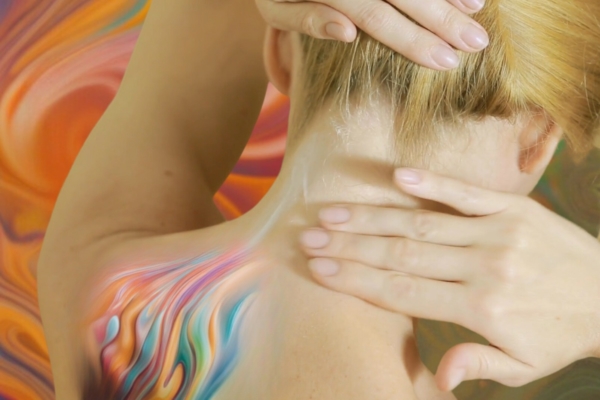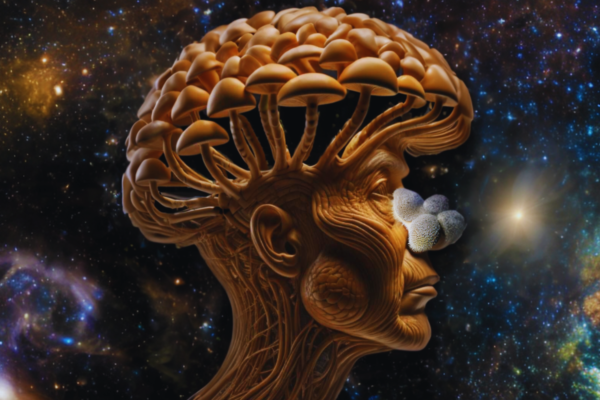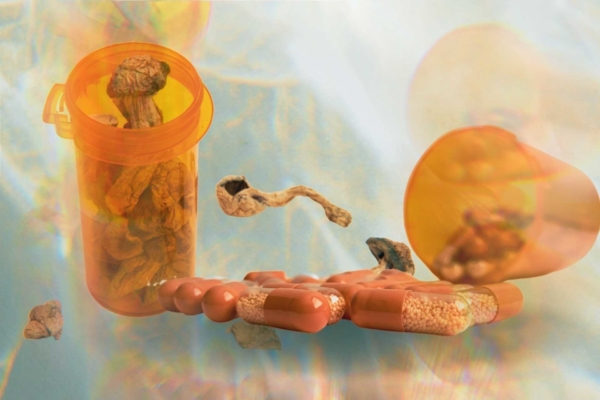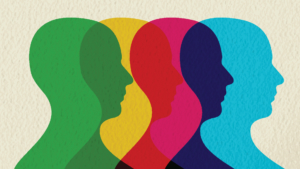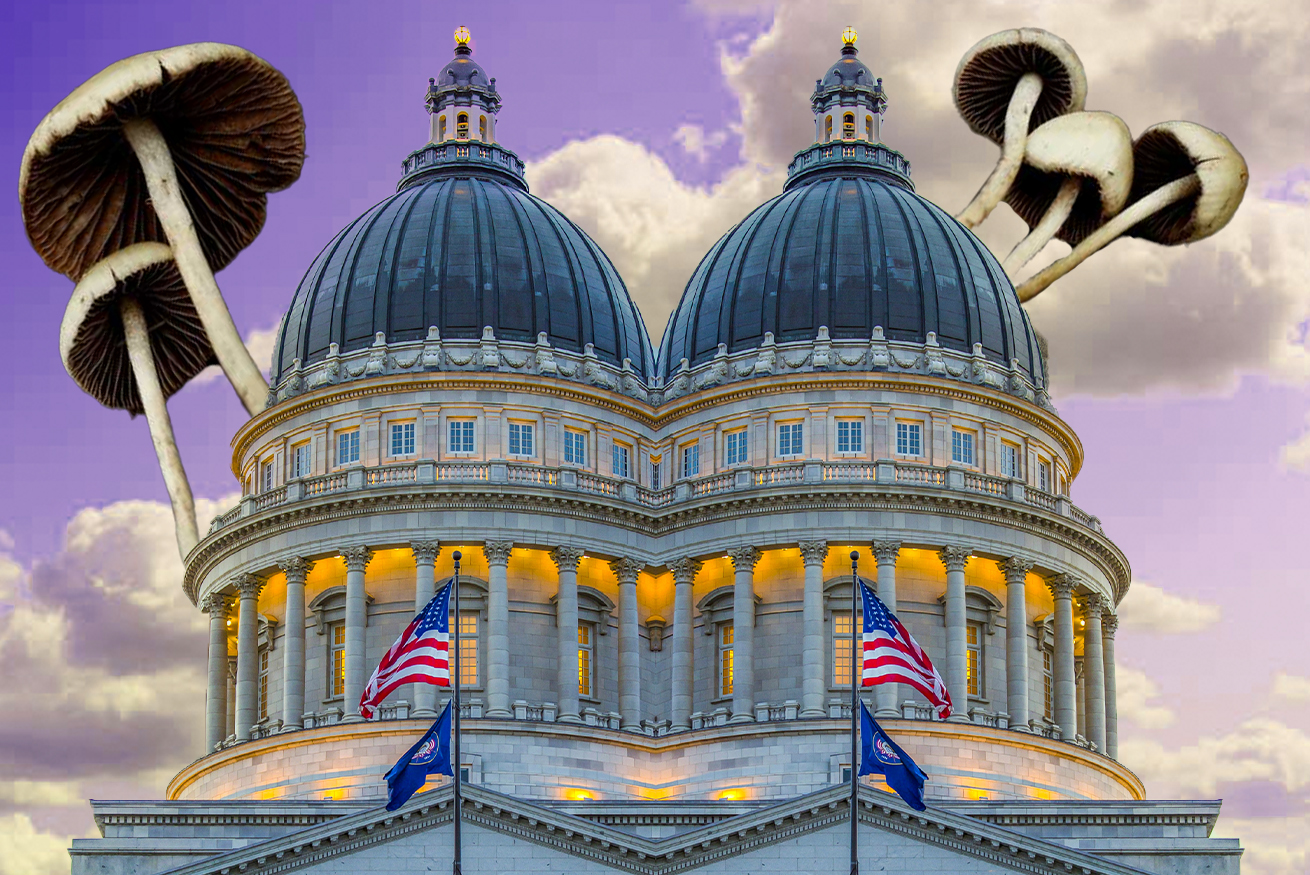
In yet another eventful week in the psychedelics sphere, the FDA released a list of considerations for researchers designing psychedelic clinical trials, acknowledging their popularity. California may be getting closer to legalizing entheogens, as a bill that passed the Senate has cleared the first of three crucial committees. At he same time, 2024 Democratic presidential candidate Robert F. Kennedy Jr. vows to legalize psychedelics.
Another clear sign of psychedelics’ popularity and acceptance comes from UC Berkeley’s Center for the Science of Psychedelics survey, which found that six in ten U.S. registered voters support psychedelics legalization.
Following Aaron Rodgers’ testimony last week, Jaden Smith also joined the psychedelics conversation by disclosing the many ways in which psychedelic use has improved his relationships, career, and outlook on life. In the same vein, the Wall Street Journal reported that Silicon Valley billionaires are reportedly taking ketamine and shrooms to manage depression and bolster their focus and creativity.
California’s Assembly Public Safety Committee has approved a bill that proposes the legalization of natural psychedelics
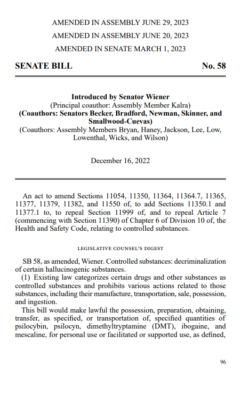
The California Assembly Public Safety Committee approved Senate Bill 58, presented by Senator Scott Wiener (D), which proposes the legalization of entheogens such as psilocybin, psilocin, DMT, ibogaine, and mescaline. This bill would allow California citizens over 21 years of age to possess, prepare, obtain, transfer, and transport specified quantities of these substances.
These are the specified quantities:
- Two grams of dimethyltryptamine, otherwise known as DMT.
- 15 grams of ibogaine.
- Two grams of psilocybin or four ounces of a plant or fungi containing psilocybin.
- Two grams of psilocin or four ounces of a plant or fungi containing psilocin.
Additionally, the bill would allow Californians to use these substances in community-based healing spaces or for spiritual guidance services. However, it excludes synthetic psychedelics such as LSD and MDMA from being legalized. It also excludes peyote due to concerns over this plant’s endangered status and its ceremonial use by Native Americans.
It is a modified version of a bill that got gutted in the Assembly Appropriations Committee last year after passing the Senate and two commissions. The Assembly removed the provisions that would have legalized entheogens from the text, rendering it useless.
The document now heads to the Assembly Health Committee, and according to Wiener, the bill’s fate is up in the air. It narrowly passed this instance last year, and it’s expected to face tougher opposition this time around.
RFK JR. wants to legalize psychedelics and marijuana, create addiction recovery centers with tax revenue
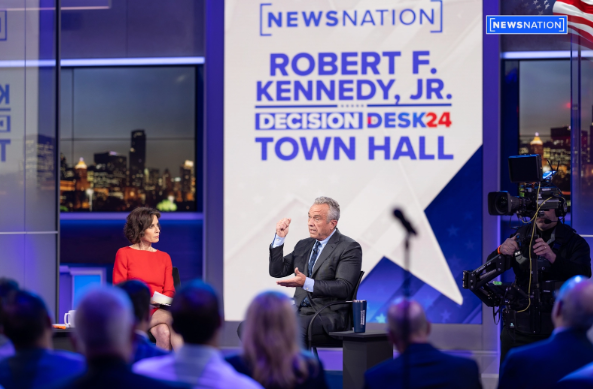
Last Wednesday, during a town hall event with NewsNation, Democratic presidential candidate Robert F. Kennedy Jr. said he would legalize marijuana and psychedelics if elected. He proposes allowing regulated access to psychedelics, particularly, for people who are struggling with mental health issues, such as addiction.
The son of former Senator and Attorney General Robert F. Kennedy and nephew of President John F. Kennedy would tax both of these substances and use the funds to create healing centers in rural areas all over the country. People struggling with addiction would retreat to these centers, where they would learn gardening, forestry, and animal care.
RFK Jr. is very critical of the current approach to drug treatment in the country, calling it a ‘predatory industry,’ and claims to have a plan to overhaul the system, making treatment easy, simple, cheap, and focused on spiritual, physical, and emotional healing.
He claims his support of regulated access to psychedelics stems from having seen how these substances benefited members of his family, veterans who suffered from PTSD, and people with depression and OCD.
The presidential candidate’s hopeful stance on this issue solidifies him as an unorthodox candidate who isn’t fully aligned with his party’s views and instead proposes a progressive take on many topics.
Survey finds three in five American voters support legalizing psychedelics
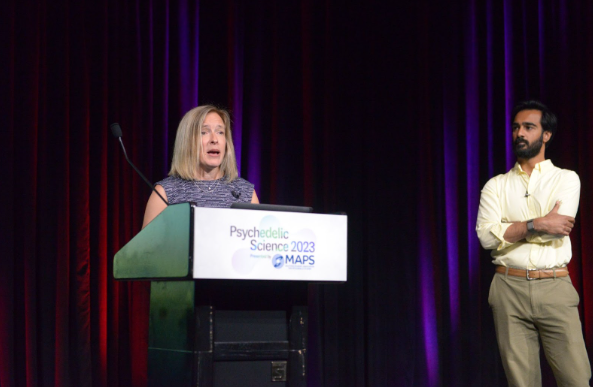
During last week’s Psychedelic Science Conference in Denver, UC Berkeley’s Center for the Science of Psychedelics (BCSP) previewed findings from a survey that explored the stance of U.S. registered voters on psychedelics.
The results exceeded the researchers’ expectations. They found that 61% of voters support psychedelics legalization, with 35% of them strongly supporting it. 34% were opposed, and 5% were uncertain. When asked if voters support facilitating research on psychedelics, 78% agreed. 49% of voters supported removing criminal penalties for personal use and possession of psychedelics.
Imran Khan, executive director of BCSP, and survey project lead, Taylor West, held a panel at Psychedelic Science where they presented the findings and gave their takeaways from the results. Despite their excitement about the American public’s support, they stressed the importance of having concrete data so that the pharmaceutical industry, policy-makers, and medical professionals can respond to the public’s demands.
We will have to wait a few more days to get the full picture, as Imran Khan, Taylor West, and BCSP co-founder Michael Pollan will hold an online briefing and presentation where they will release the full results from the survey.
The FDA is drafting guidelines for psychedelic clinical trials
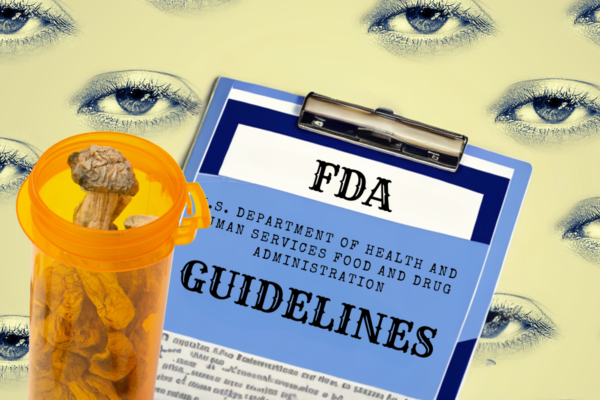
Last Friday, the U.S. Food and Drug Administration released a document that could guide researchers who want to design clinical trials investigating psychedelics’ potential for treating medical conditions. The document clarifies that it refers to ‘classic psychedelics’ such as psilocybin and LSD and ‘empathogens’ such as MDMA with the term ‘psychedelics.’
This document comes at a time when research into how psychedelics can help treat mental health conditions is gaining popularity in both the scientific community and the general public. Its goal is to ensure these studies are carried out ethically and provide reliable, interpretable data that consider the unusual characteristics of these substances, such as their rapid onset and long-term benefits after one or a few doses. This data can support future drug applications.
The paper offers considerations on how the drugs should be manufactured, how they impact the participants of a possible trial, what safety measures should be taken to prevent misuse, and how data should be collected. Instead of providing specific, definite recommendations, it is meant to establish “foundational constructs” that all sponsors studying the therapeutic potential of psychedelic drugs should consider.
This isn’t the document’s final version, giving readers a chance to leave their written comments until August 25th, 2023. The FDA may consider these comments when it begins working on the final version of the guidance.
Read also: The FDA Issues Guidance on Designing Psychedelic Clinical Trials
Elon Musk and other Silicon Valley executives have adopted psychedelic use
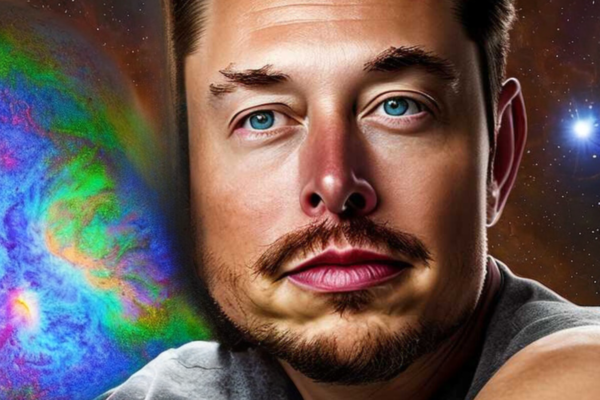
The Wall Street Journal has reported that people close to Elon Musk claim that the eccentric billionaire, owner of Tesla, Twitter, and Space X, takes small amounts of ketamine to manage depression and uses the drug recreationally.
Musk has also recently tweeted against the indiscriminate use of selective serotonin uptake inhibitors (SSRIs), which he claims “zombify” people, and instead proposed ketamine as a safer alternative when taken occasionally. The South African visionary has previously disclosed his struggles with mental health, which ketamine may be helping him with.
Elon Musk is far from being the only tech entrepreneur interested in alternative treatments, as there is a growing trend among Silicon Valley executives of using these substances to boost creativity and productivity. Another relevant case is that of Sergey Brin, co-founder of Google, who occasionally uses magic mushrooms.
In recent years, we’ve seen the likes of Will Smith, Megan Fox, Miley Cyrus, Lil Nas X, and others “coming out of the psychedelics closet,” speaking openly about how these substances have helped them overcome mental health issues and enhanced their creative pursuits. However, whether celebrities are helping or harming the psychedelic movement is becoming more and more of a debate among psychedelic advocates.
Read more: Elon Musk ‘Takes Ketamine to Manage Depression’, Report Says
Jaden Smith spoke about how psychedelics have benefitted him and his family

Also at the Psychedelic Science Conference, Jaden Smith discussed how beneficial psychedelics have been in his life, both for his creative career and for his personal relationships.
He credited his mother, Jada Pinkett Smith for introducing psychedelics to the Smith family. She had previously used psilocybin to overcome a ‘crippling depression’ and suggested that her children Jaden, Willow, and Trey, as well as her husband, renowned actor Will Smith, should try the plant medicine too.
Jaden claims that psychedelic use helped him strengthen his bonds with his siblings, increasing their connectedness and empathy toward each other to avoid petty arguments. It also inspired him to compose his mixtape Cool Tape Vol. 3, released in 2020, which he hopes can act as “a soundtrack for people to be able to study their own mystical states of consciousness.”
Smith also thanked magic mushrooms for deepening his commitment to protecting the environment, describing his first psychedelic trip as “a turning point in his understanding of nature and self.”
An overwhelmingly positive experience with psychedelics such as Jaden’s is further proof that these substances can have a life-changing impact on people’s lives and transform society as a whole through individual change.
Read also: Jaden Smith Opens Up About Psychedelics and Their Role in His Life

